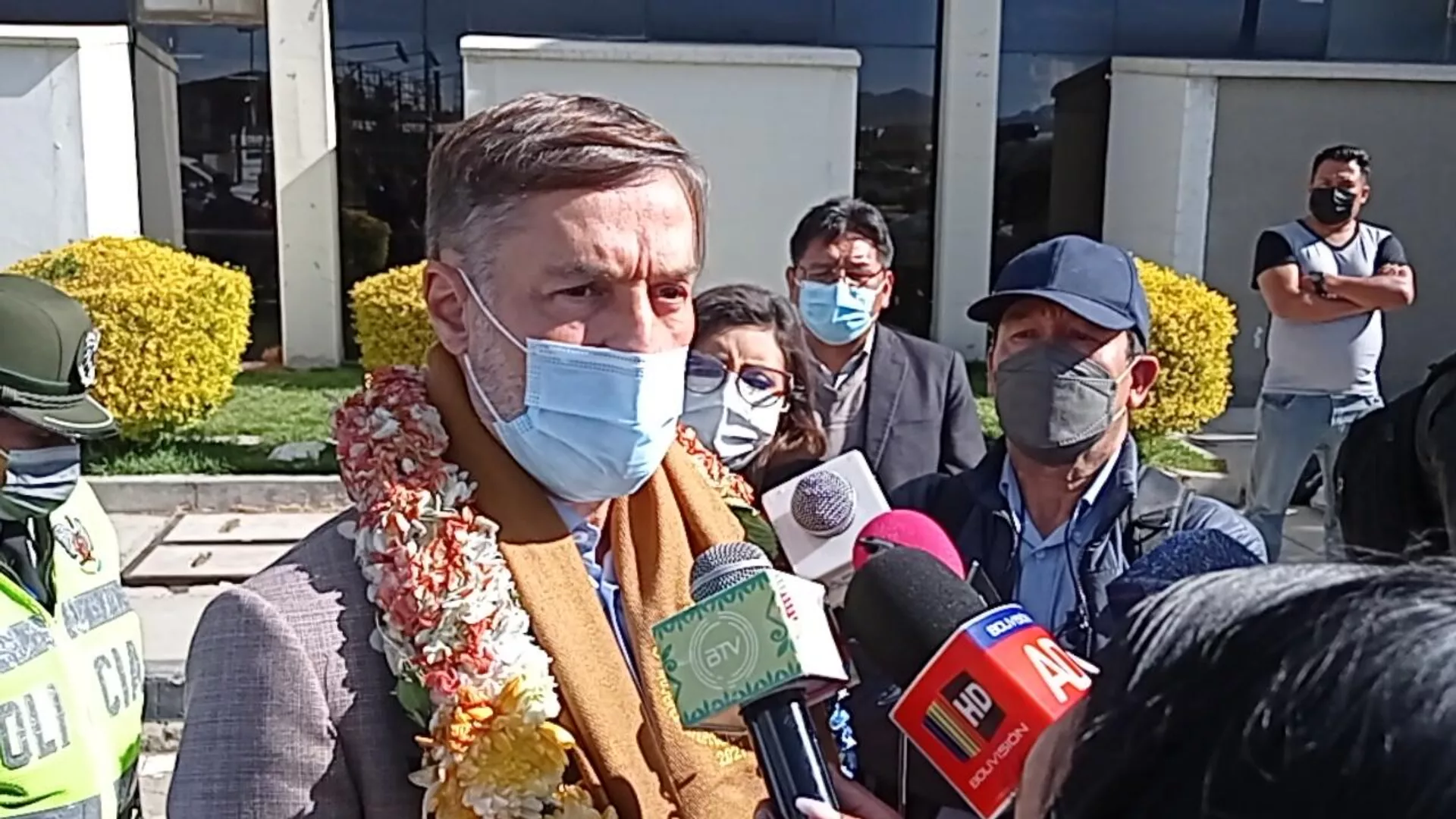
Venezuelan minister for foreign affairs Felix Plasencia upon his arrival to La Paz, Bolivia on Wednesday, May 4. Photo: Sputnik / Sebastian Ochoa.

Orinoco Tribune – News and opinion pieces about Venezuela and beyond
From Venezuela and made by Venezuelan Chavistas

Venezuelan minister for foreign affairs Felix Plasencia upon his arrival to La Paz, Bolivia on Wednesday, May 4. Photo: Sputnik / Sebastian Ochoa.
The minister of foreign affairs of Venezuela arrived in La Paz, capital of Bolivia, for a three-day visit, during which he will meet with Bolivian authorities and discuss issues of concern for both nations including the international context, marked by the conflict in Ukraine and US interference.
The Foreign Minister of Venezuela, Félix Plasencia, also plans to meet with Bolivia’s former President Evo Morales (2006-2019). The visit is intended to strengthen the strategic ties of brotherhood between the two countries.
“I appreciate the opportunity to be here,” Plasencia said after disembarking at El Alto airport. “I congratulate your government for the effort—effort and commitment to dignify the lives of Bolivians. That is what the bilateral work between Bolivia and Venezuela is about: to dignify the lives of our peoples.”
El canciller de #Venezuela, Félix Plasencia, llegó al aeropuerto de El Alto para cumplir una agenda de reuniones hasta el viernes con el presidente de #Bolivia, Luis Arce, y varias autoridades, con la finalidad de reforzar el vínculo entre ambos países pic.twitter.com/8dj0b4dHKW
— Sputnik Reporteros (@Sputnik_Report) May 4, 2022
This Thursday, May 5, Plasencia will meet with Bolivian President Arce, Vice President David Choquehuanca, and Bolivian Foreign Minister Rogelio Mayta. Although it is not confirmed, it has been reported that on Friday, May 6, Plasencia would meet with former President Morales (2006-2019).
RELATED CONTENT: Sacha Llorenti: “ALBA-TCP is Fundamentally Anti-Imperialist”
“All issues are central to the bilateral relationship, ranging from energy to caring for Pachamama, planet Earth,” Plasencia said.
The meetings will also analyze the international context, marked by the conflict in Ukraine and the interventionism of the North Atlantic Treaty Organization (NATO), led by the United States.
In this regard, Plasencia said to local press that both Bolivia and Venezuela share “a commitment to multipolarity, against interference, which only causes sadness, pain and war. We are defenders of peace.”
The Venezuelan government of Nicolás Maduro has also suffered under coercive economic measures—euphemistically referred to as “sanctions”—imposed by the US and its allies for years. “We are experiencing an unfortunate situation,” Plasencia said. “With the imposition of unilateral coercive measures, they have tried to inflict pain on the people of Venezuela.”
“We are going to talk about these temporary situations here, because we are going to solve them,” Plasencia added. “We have defeated them in a battle of commitment, love, dedication, and solidarity.” The foreign minister was referring to the self-proclamation of Juan Guaidó as interim president of Venezuela with the support of the US in 2019, an attempted coup that has been repelled.
According to Plasencia, it was essential to have the support of some countries in the region to resist US interference. “We have built a route through ALBA-TCP (Bolivarian Alliance for the Peoples of Our America-People’s Trade Treaty, formed in 2004), UNASUR (Union of South American Nations, of 2008) and CELAC (Community of Latin American and Caribbean States, 2010).
Over the years, these integration mechanisms lost some member countries, as right-wing and neoliberal governments, aligned with the US, rose to power in the region. The reactivation of these international spaces “are major issues that we are going to deal with during this visit,” Plasencia added.
The Venezuelan foreign minister commented that he will also talk with Bolivian authorities “on other issues that concern us, such as trade, air connectivity, and education, through exchange in the training of our youth.”
Meeting with Evo Morales
“President Evo is a referent, an example to follow,” Plasencia said when asked about a possible meeting with Morales. “He is a worthy man, a citizen of Our America, worthy of respect. Having the opportunity to see him is a great honor… I would return to my country with immense happiness in my heart and with great contentment.”
The issue of migration
In recent years, hundreds of thousands of citizens of Venezuela emigrated in search of better options in other countries. In this sense, Plasencia noted that more than six million people of Colombian origin live in Venezuela, as well as another ten million people from other parts of the world.
“The figures that they insist on highlighting are falsifying reality,” said Plasencia. “They say that Venezuelans flee their country, that they are refugees because they escape from a political condition. These lies are part of the war, of interference.”
Plasencia explained how, with these hyperbolic and false narratives, “they intend to discredit a political project that seeks peace and dignity for its citizens.”
Featured image: Venezuelan Minister of Foreign Affairs Félix Plasencia upon his arrival in La Paz, Bolivia on Wednesday, May 4. Photos: Sputnik/Sebastian Ochoa.
Translation: Orinoco Tribune
OT/JRE/SL/EF